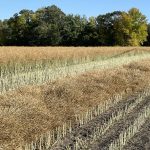John Kolk sees his involvement in the politics of Canada’s evolving chicken industry as a chance to help out an industry that has been good to, and for, him.
Last week, the 37 year old from Picture Butte, Alta., was elected chair of the Chicken Farmers of Canada.
He helps operate a family chicken and turkey farm in partnership with wife Laura, a brother and sister-in-law and parents in southern Alberta. They also grow grain and oilseeds on eight quarters of irrigated land.
“The agenda I carry in is that I want to serve the industry,” he said in a March 27 interview, the day after his election by other board members to lead the national chicken marketing agency and industry lobby. “It is something our family has been involved in for many years and it’s an opportunity to give something back. … We felt it was proper to go up to the plate and put in an effort.”
Read Also

Trade war may create Canadian economic opportunities
Canada’s current tariff woes could open chances for long-term economic growth and a stronger Canadian economy, consultant says — It’s happened before.
Kolk has been a director for more than four years. It has been a tumultuous time in the industry. He watched the chicken industry struggle through the uncertainty of the 1993 world trade talks and the 1996 trade panel decision on supply management.
Kolk was on the board when the Canadian Chicken Marketing Agency became Chicken Farmers of Canada Jan. 1, 1997.
He was there through the tense negotiations leading to the divisive 1995 agreement, which diluted the traditional supply management formula by turning national production controls over to provincial boards and their agreements with processors. Two provinces would not sign, Quebec was unhappy and producers quickly found this was a formula for overproduction and lower prices.
The results of all these decisions face Kolk now as he takes over as chair in the midst of yet another industry crisis.
Reduce power of processors
Quebec and some other provinces are demanding more national control of production if the system is to survive. Some chicken producers are demanding a change in policy to reduce the power of processors to set production levels and ultimately prices.
Kolk said his goal is to help the CFC board of directors reach compromise agreements to resolve these tensions.
“I want to make sure that the industry continues to serve the market need,” he said. “And we want to get the message out to government and industry, farmers and consumers that we are doing a hell of a good job.”














